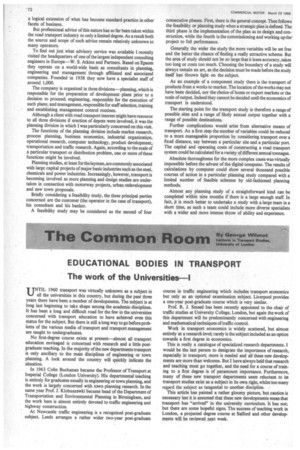The Common Roo
Page 74

If you've noticed an error in this article please click here to report it so we can fix it.
By George Wilmot
EDUCATIONAL BODIES IN TRANSPORT The work of the Universities—I
TIL 1960 transport was virtually unknown as a subject in all the universities in this country, but during the past three years there have been a number of developments. The subject is at long last beginning to take shape among the academic disciplines. It has been a long and difficult road for the few in the universities concerned with transport education to have achieved even this status for the subject. But there is still a long way to go before problems of the various media of transport and transport management are taught to undergraduates.
No first-degree course exists at present—almost all transport education envisaged is concerned with research and a little postgraduate teaching. In the majority of the new departments transport is only ancillary to the main disciplines of engineering or town planning. A look around the country will quickly indicate the situation.
In 1963 Colin Buchanan became the Professor of Transport at Imperial College (London University). His departmental teaching is entirely for graduates usually in engineering or town planning, and the work is largely concerned with town planning research. In the same year Prof. J. Klobuszewki became head of the Department of Transportation and Environmental Planning in Birmingham, and the work here is almost entirely devoted to traffic engineering and highway construction.
At Newcastle traffic engineering is a recognized post-graduate subject. Leeds arranges a rather wider two-year post-graduate course in traffic engineering which includes transport economics but only as an optional examination subject. Liverpool provides a one-year post-graduate course which is very similar.
Prof. R. J. Smeed has been recently appointed to the chair of traffic studies at University College, London, but again the work of this department will be predominantly concerned with engineering and mathematical techniques of traffic control.
Work in transport economics is widely scattered, but almost entirely at a research level; rarely is the subject included as an option towards a first degree in economics.
This is really a catalogue of specialized research departments. I would be the last person to denigrate the importance of research, especially in transport; more is needed and all these new developments are more than welcome. But I have always held that research and teaching must go together, and the need for a course of training to a first degree is of paramount importance. Furthermore, many of these new transport departments seem reluctant to let transport studies exist as a subject in its own right, whilst too many regard the subject as tangential to another discipline.
This article has painted a rather gloomy picture, but caution is necessary lest it is assumed that these new developments mean that transport has "arrived" in the university curriculum. It has not; but there are some hopeful signs. The success of teaching work in London, a projected degree course at Salford and other developments will be reviewed next week.




















































































































